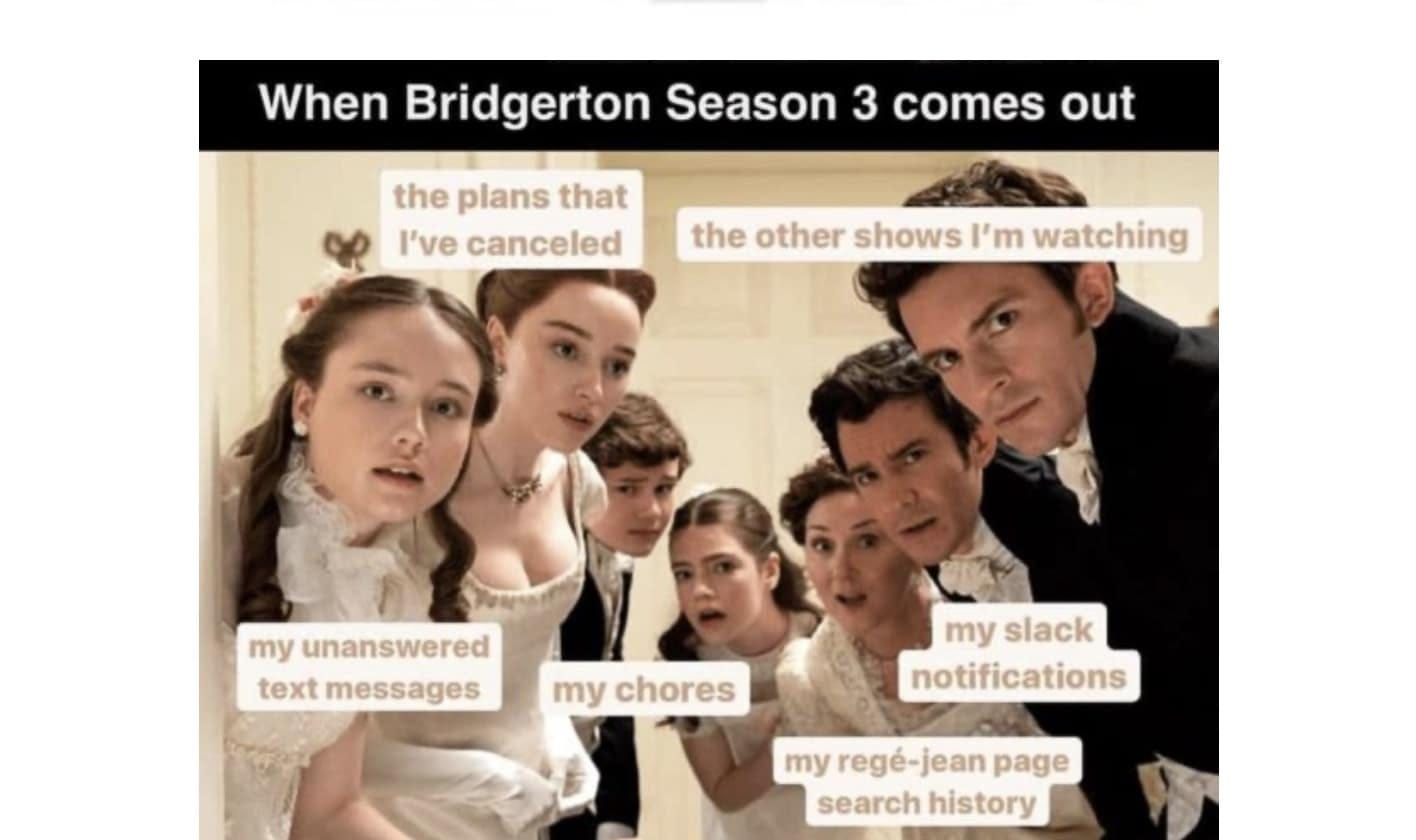29. On finding a therapist
Unprofessional advice from my therapist's favorite patient (jk, jk)
If only y’all knew the immense will power it is taking to finish this newsletter instead of bingeing the latest Bridgerton episodes right now… (and yes I said y’all, I spent last weekend with my Nashville cousins, sue me).
Curious how many of you have a little “rewards system” set up for yourselves? This is something my mom and I talk about often. Examples include: once I finish the dishes, then I can watch TV. If I eat a healthy dinner, then I can have a glass of wine. Once I finally make that annoying phone call I’ve been putting off for months, then I can mindlessly scroll Instagram. Sound familiar?
This works for me only sometimes. Occasionally there will be moments when the spell is broken and I think, wait a minute I’m not six years old. I’m a tax-paying adult. If I want to watch TV then damnit, I can watch TV. The truth is I want to be writing this newsletter. It sparks joy and functions as a very necessary outlet. The more honest truth is that yes, I would rather be watching Bridgerton. (That may not be the best thing to admit, but I’ve always held myself accountable for telling the truth in these newsletters so there you go.) What is it about Bridgerton that has this hold on us?? Thankfully I’m not a culture writer so it’s not up to me to dissect our universal addiction, but suffice to say the appeal of escapism is alive and thriving.
Instead I’m here with you all to share more about an often discussed and requested topic: how to find a therapist. It’s no secret that it is impossibly and needlessly complicated, confusing and intimidating finding a therapist. As someone with some experience in the matter, I feel obligated to share what I’ve learned.
Over the last year I have been obnoxiously vocal about my belief that nearly everyone should be in therapy. I re-entered therapy for the third time in July after my mental health breakdown, and since then have assumed the role of doomsdayer slash town crier, traveling town to town ringing my big brass bell and warning the common folk, “Don’t let what happened to me happen to you!”
I’ve successfully scared several friends and coworkers back into therapy with my ominous proclamations (hey, whatever works), but I know there are a few who are still dragging their feet, protesting, “I’ve been meaning to do it forever, but I just don’t know where to start.” This newsletter is for you.
Tips for finding a therapist:
Decide whether you want to be in-person or virtual. This is important to start with because if you want to be in-person it will change (and let’s be real, limit) how you go about finding a therapist. There are pros and cons to both options.
Going in-person to an office can be an important part of the therapy ritual. The change of scenery signals to your brain, OK we’re doing this. This is a safe space to get vulnerable. It can also create some healthy boundaries between therapy and home. You’ve heard the phrase don’t shit where you eat? Not the most eloquent, but relevant in this context. Some people also find it more helpful to be able to interact IRL to see body language, facial expressions, etc.
On the other hand, it’s tremendously convenient to do it from home. You may be more likely to stick to a schedule or prioritize therapy if it’s something you can do from your own couch, without the added commute time. It may also feel safer for some folks, being in the comfort of your own home. My favorite benefit of virtual therapy is that at the end of a particularly poignant session I can dive straight into bed and cry for a bit without worrying about how I’m possibly going to drive home when I can’t see the road through the tears.
If you do decide to go the virtual route I recommend doing it in a quiet room where you won’t be distracted, and give yourself a few minutes to gather your thoughts or journal before starting your session to help get you in the mindset. Maybe even light a candle or do a quick guided meditation, I like this one:
Decide what’s best for you, and also know that if you try one and you don’t like it, you can switch!
Explore your work benefits. This may sound obvious but there are lots of companies that offer mental health benefits now, especially since Covid. Your company may have a partnership with a mental health platform or provider. Mine offered free service through Lyra, which was a great jumping off point to getting back into therapy. Root around on your intranet or ask HR if you can’t find anything, oftentimes these benefits aren’t well advertised.
Also spend the time to understand who your health insurance provider is, and what mental health benefits they cover. This part can be unbelievably confusing and taxing, so don’t give up!! In my case I had health insurance through my husband’s work (Aetna), but mental health services were actually set up under a different provider (MHN). The world of insurance is a clusterfuck but don’t lose hope, in the words of L’Oreal: you’re worth it.
I do recognize that therapy can be heedlessly expensive in this country and it’s not in everyone’s budget. I’d urge you to find a therapist in your network to cut costs (mine is a $20 copay, twice a month) but if do you have to pay out-of-pocket think about where else you can reduce spending to make it work for you. In my opinion, therapy is a necessary, not discretionary, expense.
Ask your community for referrals. Referrals can be a great way to find a trusted therapist. If you have a close friend or relative who is a therapist and you don’t necessarily want to see them (congratulations on your boundaries), ask them to refer you to someone else in their practice.
My cousin told a story this weekend about recently being at a neighborhood BBQ. He walked up to a couple of “cool dads” (the ones in matching UnderArmour smoking cigars - this is in the South), and was surprised to find out they were talking about their shared therapist, all three of them saw the same one. “Oh cool, what’s his name?” my cousin asked. “Tony.” Tony is, you guessed it, also my cousin’s therapist. While I may not recommend sharing a therapist with your entire friend group, it does help to ask people in your community for referrals, especially if you want to see someone in-person.
Use an online therapy platform. This is where I had the most success in finding a therapist. There are a ton of online platforms to help you find a therapist including BetterHelp, TalkSpace, Rula, Alma, Grow and probably dozens more that I’m not aware of. I tried a few but ultimately used Rula because I found the search filters to be really helpful. It shows you only therapists who accept your insurance and you can filter by availability, specialty, method as well as gender identity, race and language. I’ve also had friends who’ve had great success with Psychology Today, especially if you’re looking for an in-person therapist.
If you are looking for someone in-person here’s where it gets a little tricky: you’re going to need to call or email quite a few people to double check that A) they take your insurance, B) they’re accepting new patients and C) they have upcoming availability. Again, do not lose hope!!! I probably reached out to fifteen different therapists, some of whom never got back to me. Keep putting yourself out there (and maybe reward yourself with a little treat or your favorite show every time you reach out to someone new 😉).
Read their website/bio. This is an important part of the process because it gives you your first glimpse into what working with this person might be like. Depending on what you’re looking for pay attention to what information they share in their bio, and the overall tone.
Looking for someone friendlier/warmer? Keep an eye out for exclamation points. No nonsense, down to business? Shorter sentences or even bullet points. Search out words that are important to you and align with your values i.e. collaborative, supportive, empathetic, warm, nonjudgemental, calm, mindful etc. If you know what specific type of therapy you’d like to explore (CBT, EFT, IFS, EMDR, etc.) look for that information in their bio. If you don’t know what any of those acronyms mean, don’t worry about it and try looking for keywords instead: depression, anxiety, grief, loss, relationships, stress, crisis, family systems, substance abuse, etc.
An important note here: there are lots of different licenses for therapists. You might have heard terms like LMFT, LCSW or LCP. Don’t worry too much about these. It’s unnecessarily confusing but they’re all licensed professionals and the most important thing is that you have a good relationship with your therapist.
Schedule multiple consults. Most therapists offer free introductory consultations. These are typically ~20 minutes long and give you a chance to check the ~*vibe*~. In my experience, you’ll know within the first five minutes if someone is right for you or not. I’d recommend scheduling 3-5 consultations, but no more than that so that you don’t get overwhelmed with analysis paralysis. Also do not schedule these on the same day. Telling your story to strangers, and in some cases reliving your trauma, can be emotionally exhausting. Give yourself a break and a chance to reset your nervous system. During the consultations pay attention to their tone, the kinds of questions they ask you, and how safe/comfortable you feel with them. That leads me to #7…
Go with your gut. Again, this is kinda no brainer advice but listen to your intuition on this one. Notice how you feel during and immediately after the consultation: lighter? relieved? more anxious? Use those somatic signals as clues guiding you towards the right therapist. If you’re feeling stuck in the decision try journaling about it, or jumping/dancing around your house. Always helps me.
Know that you can always change! If after a few months you aren’t feeling the connection or something just seems off (or if at ANY point you feel unsafe), do not be afraid to break up with your therapist. You do not need to feel guilty or like you “owe” them anything. You also don’t have to “stick it out.” Therapy is going to be uncomfortable, yes. That is, unfortunately, the name of the game. But the right therapist will help you face that discomfort in a way that feels right for you.
Notice if it’s the therapy that’s making you uncomfortable, or the therapist. There may also come a day when you feel like you’ve outgrown your therapist or you just need a different perspective, and that’s okay too. Think of it like a supportive boss who helps you get a well-deserved promotion, even if it means you’ll no longer be on their team. That’s the vibe we’re going for.

And that’s it. Simple, right? 😏 I hope this was helpful in demystifying the process of finding a therapist. If I missed anything please feel free to weigh in in the comments!
I’d love to hear from you:
How did you find your therapist?
Virtual or in-person and why?
Shout out your therapist! (Bless you, Marsha).
I also recognize that not everyone has a good experience with therapy. There are plenty of bad therapists out there, the same way there’s bad doctors, lawyers, and teachers. If you’ve had a not-so-savory experience in the past, I encourage you to get back up on the therapy horse and try it again (or actually just try equine therapy, it seems lovely). At the risk of sounding incredibly cringe: your mental health is just as important as your physical health. Think of therapy the same way you’d think of going to the gym or the grocery store. Stop putting it off and make it a priority.
And with that, I shall retire my brass bell and leave you to it. Off to Bridgerton! #teampolin
Until next time, thank you for being here.
PS If you liked this edition of Sundays in high school you might also like:
27. On holding space
TW: this newsletter discusses the topic of suicide and suicide prevention. If that topic feels overwhelming for you right now feel free to skip it. Take care of yourself, first and foremost. Also please be aware that I am NOT a mental health professional. This is based on my personal experience as a volunteer crisis counselor but should not replace medic…









A former coworker of mine actually made a full PowerPoint presentation about herself to share with potential therapists during those free consults. It was a way to share her history and past experiences in therapy efficiently without exerting too much emotional energy early on.
She titled it “My Trauma” because it helped to sus out the therapists she definitely wasn’t going to jibe with right away (and also a little dark humor never hurt anybody 😂)
We need a “Tinder but for Therapists” situation to make this search process easier 😅. Thanks for sharing all this information!
Lisa!